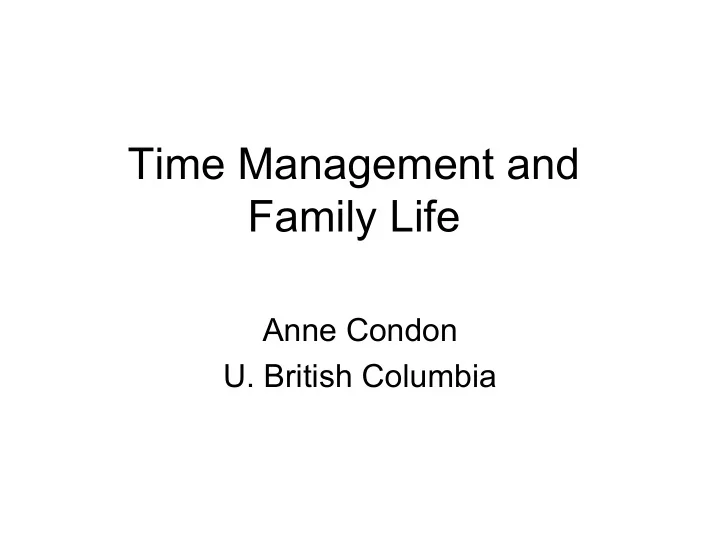

Time Management and Family Life Anne Condon U. British Columbia
Guiding principle: know yourself • what’s really important for you to do over the next few years? • what would you like others to say about you after the next few years? • what’s important to those you care about?
Using time effectively • remember that creating and maintaining a strong research program takes lots of focus • much of your research time may be devoted to your students • there will be many distracting chores!
Using time effectively: working with students • build a positive working relationship with your graduate students – every student is different! be prepared to adapt – set clear expectations (preparing for meetings, funding, proofreading notes, managing timelines/deadlines, handling collaborations, etc.) – prepare to ensure meetings are productive – respond promptly to student needs (letters of reference, award nominations, writing feedback ..) – build a research group in which people help each other
Using time effectively: working with students – praise good effort! promote your students! – provide constructive feedback when work doesn’t meet your expectations – support students through rough patches – ask for help from your students when appropriate (occasionally covering classes, paper reviews) – when things go wrong: act promptly; seek advice, support from mentors
Using time effectively: handling “chores” • set aside concentrated periods for your work • in service tasks, (program committees, other committees): focus on ways that YOU can make a difference • figure out how to manage teaching chores (special requests, late homeworks, grading, cheating) • when you have a trip, plan to keep meetings to a minimum on the day after you get back (if possible)
Using time effectively: handling “chores” • a strategy for learning to say "no”: say "let me think about it”; then assess and consult • when you do say "yes", be clear up front about the scope of the job and the level of commitment you can bring • use the opportunity to take on something new as a chance to let go of something else • work with people who seem to be good at getting things done; it does rub off
Family time! •it’s possible and very rewarding to have a great family life and great career
Family time!
On balance • take advantage of flexibility that academic schedules allow • find the things that you enjoy and can share with your family • remember your time becomes yours again as your kids get older balance is regained!
Strategies for staying sane • find a caregiver you really trust, especially during the early years • learn the benefits of parallel processing (oversee kid homework crises while cooking) • foster kids' independence in daily tasks • share responsibility around the house • figure out which things can "give" no need for perfection!
Recommend
More recommend